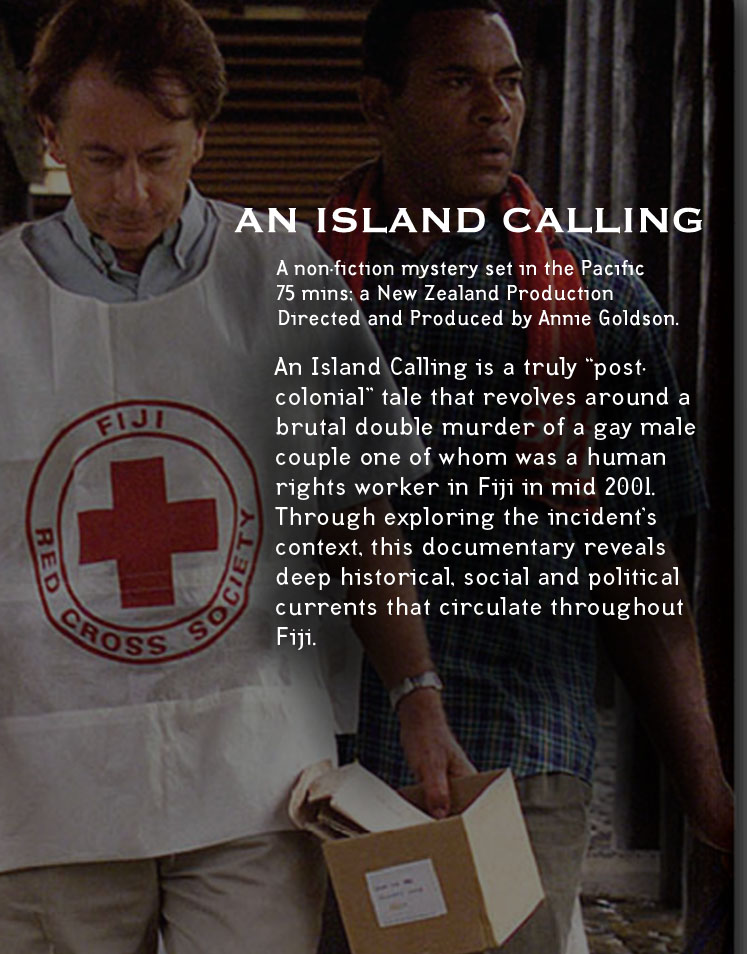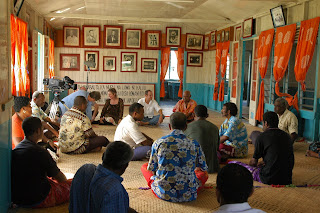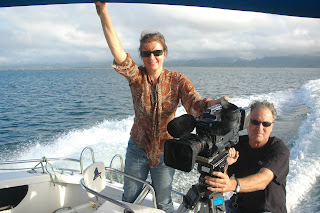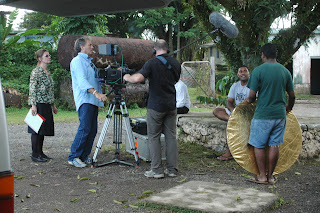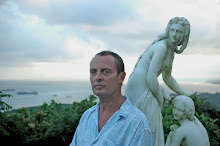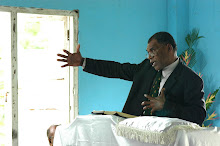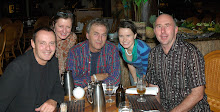On my way to Suva, taking An Island Calling back from whence it came – an important ritual in the Pacific, an acknowledgement of not only the literal work that many people did, but also of the land and ancestry. I fly into Nadi, the west coast, place of beaches and sugar, of hard-working farmers and complicated leasing systems that seem to have left everyone dissatisfied. Nadi is the feeder town too to the resorts, huge self-contained worlds in which every luxury seems available, childcare, massage, food, and entertainment. One is ferried around their vast tropical acreages in little buggies reminiscent of the cult TV show, The Prisoner. Right now, because of the 2006 coup, tourists are nervous and the resorts are under-subscribed – mind, the airport lines were long, people hot and tired. Nadi in its urban dusty Pacific way is peaceful – filled with electronics stores and fabric shops that glow like jewels.
It is Suva where the political action is and we head for the capital on what is referred to as the “highway”. My friend drives over to get me. The island is sharply divided into a dry and wet side, and over the divide, an hour out of Suva, we descended into pothole hell. The road is dark and the lights of the ongoing vehicles are momentarily blinding making the drifting groups of young men walking along with verges hard to see. Having missed the last bus drift some stick out a hitchhiker’s thumb at the few cars.
We arrive in Suva around midnight. The nightclubs – Traps, O’Reilly’s – are still in full swing, with bouncers and drinkers milling around outside the front doors. There are still checkpoints in place, remnants of December perhaps, or more likely because of a jail break. Escapees take to the islands and disappear.
Suva is difficult but interesting, the cultural and class mix volatile and lively. I have anxieties about showing the film here. There are the political concerns – is it likely to trigger a response from the interim regime? Although the film is all about Fiji’s history and politics, it is not really about the recent coup, more the various coups stretching back to 1987 are “backdrop” to the more personal story of the murder. But would a group of soldiers determined to be offended examine the nuances of the film? Does this pose risks to the film’s subjects? Then there are the personal concerns. Owen Scott, the film’s main character and brother of one of the murdered men, is already in Fiji. It is not easy for him to return and this time, it seems harder somehow. We will present the film together. He would be uncomfortable if the murderer’s family turn up at the screening. He is not ready to forgive or believes that forgiveness is not his alone to give. To screen the work publicly in Fiji with the family present could indicate locally that forgiveness has been given. In other instances, I would have asked Apete’s family as they were important characters within the film – but now we hold a closed screening and carry out tight surveillance. Nothing eventuates but we all feel exhausted. The audience in Fiji is surprisingly quiet, far less so that the talkative Canadian and New Zealand audiences that have seen the film thus far. Maybe it is too close to home.
Next stop Sydney, holed up in the very flash Hilton on George, worlds away from Suva.
Monday, July 7, 2008
Wednesday, June 11, 2008
Production photos
Tuesday, June 10, 2008
Making An Island Calling
The story behind An Island Calling has a complex moral nature, which has made it a fascinating and challenging film to produce. Fiji is a group of islands known for its extraordinary beauty, a romantic tourist destination. But it is a highly complex culture, fissured by its colonial history, cultural differences, poverty and religious beliefs.
I attempt to address this complexity through exploring the context surrounding the violent incident at the film's heart -- the double murder of a gay couple by a younger indigenous friend of theirs. I needed to be highly sensitive to the family members of "both sides" as I negotiated the process of filmmaking. In addition, soon after I began shooting the film, Fiji's fourth coup erupted, complicating matters further. An Island Calling is the only recent film to address Fiji's fascinating history and culture, using the intimate story of two families to do so. But the themes and conflicts it engages with - indigenous rights and colonial histories, minority rights, class differences, homosexuality, homophobia and fundamentalism - are relevant the world over. I have received significant funding from local funders, New Zealand on Air as well as from Australian (SBS-TV Australia), and US sources (Sundance Documentary Institute) indicating that even before completion, the universalities, as well as the specificities, of the film were appreciated.
I am trying to reach a broad-based educational and activist audience through film festivals, theatrical releases, television and DVD distribution. I have produced a number of documentaries in New Zealand Aotearoa, such as Punitive Damage, Georgie Girl, Sheilas: 28 Years On, Pacific Solution: from Afghanistan to Aotearoa, and Elgar's Enigma that have found significant international audiences as well as resonating at home. I aim to make accessible works that do not, I hope, compromise their political vision and believe that this new film will achieve these goals.
- Annie Goldson, Director and Producer
Subscribe to:
Posts (Atom)
